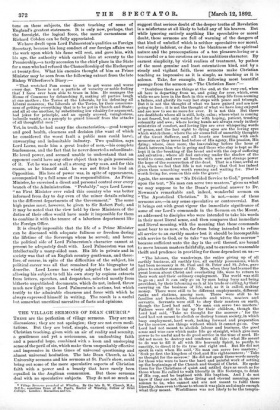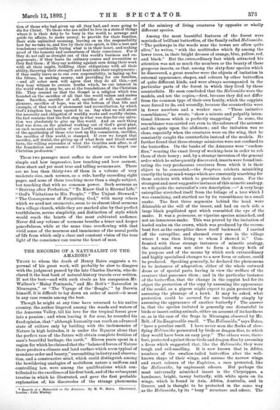THE VILLAGE SERMONS OF DEAN CHURCH.*
THEBE are the perfection of village sermons. They are not discussions; they are not apologies; they are not even medi- tations. But they are brief, simple, earnest expositions of Christian teaching, given with an air of reality and serenity, a gentleness and yet a seriousness, an undoubting faith and a peaceful hope, combined with a keen and unsleeping sense of the peril of sin, which make them unspeakably effective and impressive in these times of universal questioning and almost universal hesitation. The late Dean Church, as his University sermons and his sermons at St. Paul's show, could bring out some of the more speculative aspects of Christian faith with a power and a beauty that have rarely been equalled in the Anglican communion. But these sermons deal with no speculative subjects. They do not so much as • Village Serrnms preached at Whatley. By the late R. W. Church, MA, D.C.L., sometime Dean of St. Paul's, Rector of Whatley. Fellow of Oriel College. London : Macmillan and Co.
suggest that serious doubt of the deeper truths of Revelation is a misfortune at all likely to befall any of his hearers. But while ignoring entirely anything like speculative or moral doubt, these sermons are full of warning of the dangers of that kind of unbelief which is neither speculative nor moral, but simply indolent, or due to the blankness of the spiritual nature and the preoccupations of a too pleasure-loving or a too careful or a too covetous or a too ambitious character. By earnest simplicity, by vivid realism of treatment, by pathos of the most genuine and least ostentatious kind, and by a steady and vigilant faith, these sermons make Christian teaching as impressive as it is simple, as touching as it is solemn. Take, for example, the following most beautiful passage from the sermon on "The Christian Race :"—
" Doubtless there are things at the end, at the very end, when all here is departing from us, and going for ever, which, even while we are here in the flesh in this world, keep life from seeming a failure, and glorify its very last steps with peace and triumph. But it is not the thought of what we have gained and are now going to lose ; it is not the thought of what we have long enjoyed and are now to see no more for ever. It is not this But there are deathbeds where all is still, holy, calm; where what is coming is not feared, but only waited for with hoping, patient, trusting solemnity and awe ; where loving hands are always ready in their ministries of comfort, and loving lips are ever whispering words of peace, and the last sight to dying eyes are the loving eyes which watch them ; where the air seems full of unearthly thoughts of the Great Sufferer, and all hearts are bursting with such memories as they never had before of His agony, His passion, His dying; where, once more, the leavetaking before the hour of death between him who is going and those who stay is kept as He kept it in the breaking of the bread and with the cup of suffering and salvation ; where all feel entering under the shadow of the world to come, and over all broods with new and strange power the hope of the resurrection of the dead. That is a time, awful as it is, when we feel that life is not vanity ; that God has indeed given them something worth running and waiting for. That is worth living for, even on this side the grave."
Again, the sermon on "No Divided Service to God," preached upon the text, "No man can serve two masters," gives us what we may suppose to be the Dean's practical answer to Dr. Newman's remarkable and, indeed, wonderful sermon on " The Apostolical Christian." It is not,—none of these sermons are,—in any sense speculative or controversial. But it brings out with great vigour the immediate significance of some of our Lord's commands in the Sermon on the Mount,
as addressed to disciples who were intended to take his words in their most literal sense, and then compares that immediate and literal meaning, with the meaning that these commands must bear to us now, who, far from being intended to refuse all service to an earthly master lest it should be incompatible with service to God, or to take "no thought for the morrow" because sufficient unto the day is the evil thereof, are bound to serve human masters faithfully, and to exercise a reasonable thrift and prudence in providing for those dependent on us :—
" The labours, the wanderings, the entire giving up of all earthly business, all earthly ties, all earthly possessions, which had been necessary in St. Paul and St. Peter and St. John, gave place to another manner of life. Men, when they had learned the great lesson about Christ and everlasting life, were to return to their work and their ordinary employment. The world was still to go on ; and it can only go on by men being busy and being provident, by their labouring each at his trade or calling, by their carrying on the business of life, and, as it is called, making money. There were still to be different employments, different ranks and stations, among men. There were still to be families and households, husbands and wives, masters and servants. Servants were still to obey their masters on earth, though the Lord had said, 'No man can serve two masters.' Fathers were still to lay up for their children, though the Lord had said, 'Take no thought for the morrow ; ' for the Lord bad not meant to abolish or destroy human society, in which busy employment, hard work, looking forward and preparation for the morrow, are things without which it cannot go on. Our Lord had not meant to abolish labour and business, the good sense and wise care which make life go straight, which give men power to be useful and to do good service in the time of need. He did not mean to destroy and condemn all this : what He meant to do was to fill it all with His heavenly Spirit, to purify, to sanctify, to direct it to its true and right end. But He did not speak in vain when He said, 'No man can serve two masters ; ' Seek ye first the kingdom of God. and His righteousness ; " Take no thought for the morrow.' He did not speak these words merely for those who were to have the hard and painful work of setting up the beginnings of the Church and Gospel of Christ. He spoke them for the Christians of quiet and settled days as much as for those whom He called to walk literally in His footsteps, to drink of His cup, and be baptised with His baptism. And I do not know if they are not, in their living and eternal meaning, more solemn to us, who cannot and are not meant to fulfil them literally, than even to those to whom it was plain and simple enough what they meant. Worldliness was not likely to be the tempts- tion of those who had given up all they had, and were going to die for Christ. To those who are called to live in a state of things where it is their duty to be busy in the world, to arrange and guide its affairs, to make money, to provide for their families, their wide unlimited meaning, leaving on us the responsibility how far we take in, and live by their true spirit, is like a test and touchstone continually trying what is in their heart, and making proof of the honesty and earnestness of their conscience. For if -they do not call us straight out of this world's business and en- gagements; if they leave its ordinary course and necessities DA they find them; if they say nothing against men doing their work with all their might, fulfilling their obligations with all their ability, throwing their strength and heart into their employments ; if they really leave us to our own responsibility, in laying up for the future, in making money, and providing for our families, —and all sober men will agree that they do all this,—yet they bear witness to certain truths which, be our interest in the world what it may be, are at the foundations of the Christian life. They remind us that the Gospel is a religion which was founded on the sacrifice of all that the world values and makes dear. Sacrifice, sacrifice of self, sacrifice of will, sacrifice of pleasure, sacrifice of hope, was at the bottom of that life and example, of that work of atonement and reconciliation, by which God's kingdom has been opened to us. Say what we will about the necessity and obligation of worldly works and worldly claims, the fact remains that the first step in what was done for our salva- tion was absolutely to give up this world. And on each thing that was done, on the gradual working out of God's great plan, on each moment and action of our Lord's ministry, on each point of the apostleship of those who took up His commission, sacrifice, the sacrifice of this world, is stamped. If ever we forget that sacrifice, self denial, the giving up of what flesh and blood would have, the willing surrender of what the Gentiles seek after, is of the foundation and essence of Christ's religion, we forget our Christian profession."
These two passages must suffice to show our readers how simple and how impressive, how touching and how earnest, these short and yet most true and telling sermons are. There are no less than thirty-two of them in a volume of very moderate size, each sermon, as a rule, hardly exceeding eight pages, and none of them touching more than a single subject, but touching that with no common power. Such sermons as "Striving after Perfection," "To Know God is Eternal Life," ." God's Visitations to His People," "The Unjust Steward," -" The Consequences of Forgetting God," with many others which we need not enumerate, seem to us almost ideal sermons for a village church, while they are marked also by that perfect truthfulness, serene simplicity, and distinction of style which would reach the hearts of the most cultivated audience. Never did any volume of sermons breathe a truer and deeper peacefulness, while at the same time overflowing with that vivid sense of the nearness and imminence of the moral perils of life from which only a clear and constant vision of the true light of the conscience can rescue the heart of man.



































 Previous page
Previous page